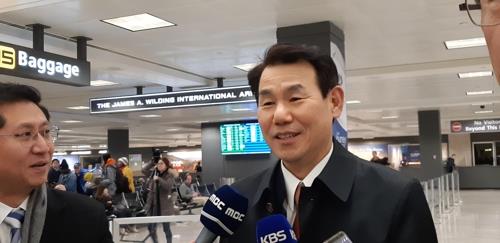- California Assembly OKs highest minimum wage in nation
- S. Korea unveils first graphic cigarette warnings
- US joins with South Korea, Japan in bid to deter North Korea
- LPGA golfer Chun In-gee finally back in action
- S. Korea won’t be top seed in final World Cup qualification round
- US men’s soccer misses 2nd straight Olympics
- US back on track in qualifying with 4-0 win over Guatemala
- High-intensity workout injuries spawn cottage industry
- CDC expands range of Zika mosquitoes into parts of Northeast
- Who knew? ‘The Walking Dead’ is helping families connect
S. Korean negotiator hopes for ‘win-win’ burden-sharing deal with U.S.
South Korea’s top negotiator in defense cost-sharing talks with the United States said Monday that he believes the two sides will be able to strike a “win-win” deal based on their common understanding of the bilateral alliance.
Jeong Eun-bo, the top envoy to the Special Measures Agreement negotiations, made the comment upon arriving at Washington’s Dulles International Airport ahead of the fourth round of talks slated for Tuesday and Wednesday.
The previous round of talks in Seoul last month was cut short, publicly displaying the rift between the allies over how to share the costs for the stationing of 28,500 American troops in South Korea.

Jeong Eun-bo, South Korea’s top negotiator for the Special Measures Agreement, speaks to reporters at Washington’s Dulles International Airport on Dec. 2, 2019. (Yonhap)
“There were areas that didn’t go as planned, but because the two countries still share an understanding of the South Korea-U.S. alliance and the strengthening of the joint defense posture, I believe we will be able to produce a win-win result if we continue discussions with patience,” Jeong told reporters at the airport.
Under the current one-year SMA, which expires at the end of the year, South Korea is required to pay US$870 million for Korean civilians hired by the U.S. Forces Korea, the construction of military facilities to maintain the allies’ readiness and other forms of support.
The Trump administration has reportedly demanded Seoul increase its contribution fivefold to nearly $5 billion next year.
Asked if his delegation had come up with a new offer, Jeong said without elaborating that they came prepared with “various alternatives.”
He also stressed that the two sides have been in “close communication” since the last round of talks.
“As a basic rule, there must be a reasonable and fair burden-sharing,” Jeong added. “Ultimately, our most important principle is that the negotiations must contribute to the South Korea-U.S. alliance and the strengthening of the joint defense posture.”
Asked about the possibility that the SMA will be revised to require South Korea to cover other cost categories, Jeong said it is Seoul’s position to negotiate within the current framework.











